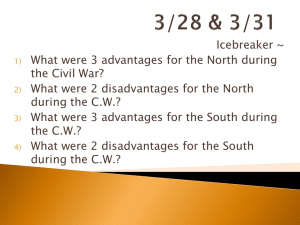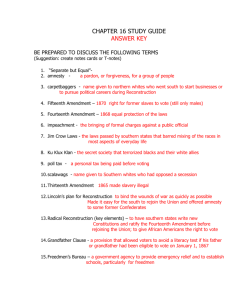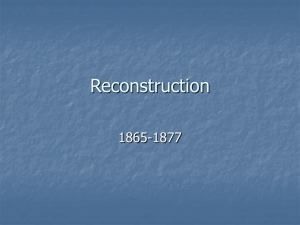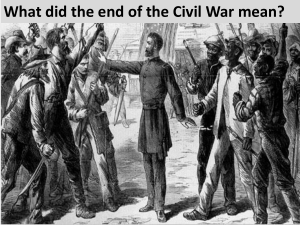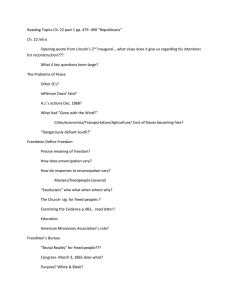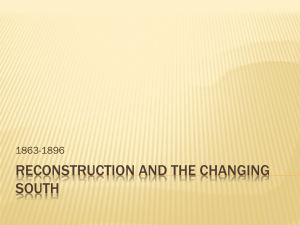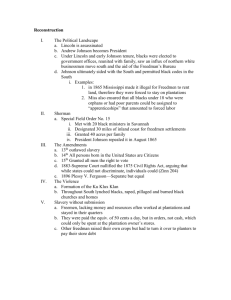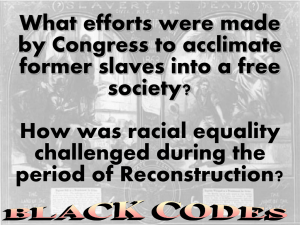American Reconstruction
advertisement
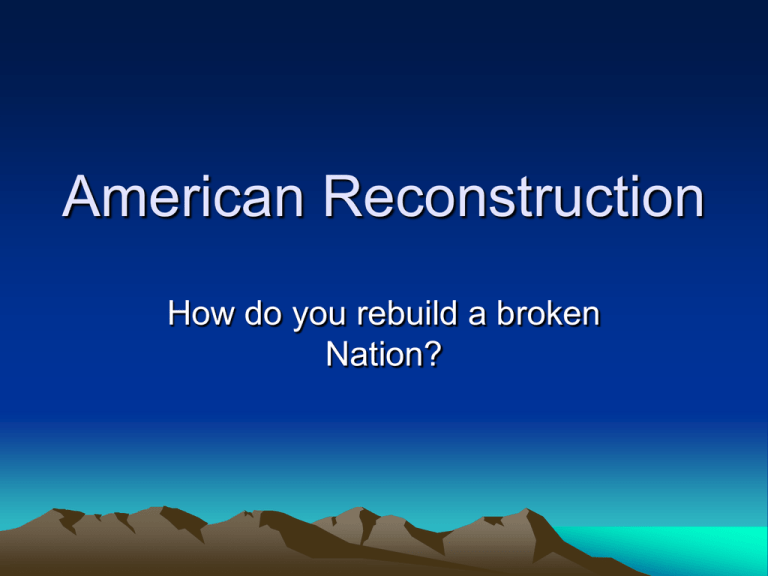
American Reconstruction How do you rebuild a broken Nation? How did the North and South differ after the war? • North: lost more men, farms and cities not destroyed, economic problems were short term, only needed to re-load the factories/farming. • South: Farms, bridges, railroads, major cites of Richmond, Atlanta, Columbia destroyed, financial system destroyed, loss of capital, land prices plunged. • What do you do with 4 million “Freedmen”? Overnight former slaves were now free. Lincoln’s View for Reconstruction • Believe the sooner country united the faster South could re-build • Ten Percent Plan only 10% of population needed to be loyal to form government • Abolish slavery • Could elect members of Congress • Amnesty, government pardon of all who swore allegiance to the USA. • Did not apply to former leaders Wade-Davis Alternate Plan • Required a majority of white men to declare loyalty. • Denied right to vote to anyone who volunteered in the Confederate military. • Passed in Congress, Lincoln Vetoed thinking it was too harsh. Freedmen’s Bureau • Government agency to assist former slaves. Lincoln and Congress agreed • Provided food & clothing • Tried to find jobs. • Provided medical care >1million people • Also offered help to poor whites in the South • Most important, set up schools. Teachers volunteers from the north, mostly women. • Became the basis for public schools in the South. It also set up black colleges in the south. A New President • Lincoln is killed April 14th, 1865 • Vice President Andrew Johnson, new pres. • Johnson’s plan was mild, majority loyalty, ratify the 13th Amendment banning slavery, and quick admittance into the Union and forming Governments. • It did not bar former Confederate leaders from holding office many were elected to serve in Congress, this angered many in Congress. Black Codes 1865-1866 • Most southern state passed strict restrictions on the new Freedmen. • Limited fundamental rights of citizenship such as voting, meeting, travel, jobs, gun ownership, serve on juries. • Many freedmen were attacked, riots, black churches and school burnt • Many in the South refused to acknowledge the federal government authority. Problem of Poverty do not write • Freedmen had no land and little opportunities. • Some wanted to break up large plantations and distribute the land, did not happen • Plantation owners had land, but no one to work it. Radicals Republicans in Congress • Radical Republicans believed South was trying to keep slavery alive. • Break the power of wealthy planters • Ensure Freedmen received right to vote. • Charles Sumner of Ma. • Thaddeus Stevens of Pa Actions Taken • Passed Civil Rights Act of 1866, passed over a Presidential Veto, granted rights to vote. • Feared the Supreme Court would over ride • Passed on to the states the 14th Amendment granting citizenship rights to all born or naturalized in the United States • The hope was that if you could vote, you could protect your rights through elections. Reconstruction Act 1867 • President Johnson was seen as pro-south • Many blacks killed in south during 1866 election • Radicals in Congress pass their own plan. Reconstruction • All states required to ratify the 14th amed. • Only Tennessee admitted. • 5 military districts with military commanders given power to govern the South. Military rule hated • All states in south required to rewrite state constitutions. • Must allow Freedmen/African Americans the right to vote. Johnson is Impeached • President Johnson opposed Radicals in Congress. • He fired many military commanders in support of reconstruction • He was impeached and tried for removal from office, kept his seat by only one vote • Johnson had no political power after Election 1868 • General Ulysses S. Grant is elected. • Over 500,000 freedmen voted in the South, most for the Republicans. • Many in the North felt this could help in the North, and that all blacks should have right to vote. • 15th Amendment is passed and ratified in 1870. • Grants the right to vote all citizens (male) regardless of race, color, condition as former slave. South Under Reconstruction • Scalawags were white southerners who supported Reconstruction, many were business owners • Northerners who came South for opportunities or to take part in Reconstruction were known as Carpetbaggers. http://www.knowla.org/image.php?rec=8 35&entry=761 • Many Freedmen became leaders and elected officials. White Southern Resistance • Conservatives resented Northern control • Believed power should be in White control • Tried to force blacks back onto plantations as share croppers. • Secret Societies such as Ku Klux Klan were formed to intimidate blacks from exercising voting rights and political rights. Problems of Reconstruction • • • • • The cost of rebuilding the south. Raised taxes Allowed women to own property Built schools, roads, telegraph, railroads. Corruption in government increased southern resentment. Cycle of Poverty • • • • Freedmen received “nothing but Freedom” Owned no land and little opportunities Many poor Southern whites as well Large plantation owners had land, but no workers. • Sharecropping develops as a form of agricultural labor Sharecropping • Rent land from owner who provides the seed for planting, fertilizer, tools, loans. • In return you provide the owner a “share” of your crop at harvest. • Kept poor people in the South in debt to the owners. • If crops failed, you had to borrow more. • This kept many poor and a few wealthy in the South. Why did Reconstruction end? • Many became tired and were looking ahead • Many lost faith in Republicans to lead. • Amnesty Act of 1872 gave most white southerners the right to vote, they voted Democratic. • Election of 1876. A deal was struck. • Rutherford B. Hayes Republican from Ohio ran against Samuel Tilden Democrat of New York • Election ended in a tie with disputed votes in 3 states. • Deal was struck behind the scenes. All the disputed votes would be granted to Hayes if he agreed to end Reconstruction in the South. End results • North turns a blind eye to the South • South imposed voting restrictions on blacks. • Poll Taxes-tax to pay to vote, many Freedmen did not have $ • Literacy Test- had to pass a test of reading to vote, most blacks could not • Grandfather Clauses- if your father or grandfather had the right to vote before 1867, you could vote regardless of literacy. No blacks had the right before 1867, so basically only whites had the right to vote in the South. Jim Crow Laws • Southern states pass series of laws and codes that basically make segregation the law. • Schools, restaurants, theaters, trains, streetcars, playgrounds, hospitals, cemeteries. Rise of the New South • Over time South started develop a new economy • 1880 as much cotton as 1860 • Growth of the tobacco industry in North Carolina, Duke family • Textile mills to process the cotton • Steel industry in Birmingham Alabama • Oil industry Gulf Coast Louisiana Texas • Timber, minerals, copper, marble • Furniture industry South at 1900 • Although the south slowly recovered from the Civil War and had a more balanced economy… • The South entered the 20th Century behind the Northern industrial/agricultural states setting up future conflicts.
